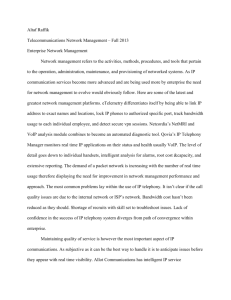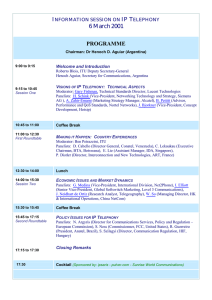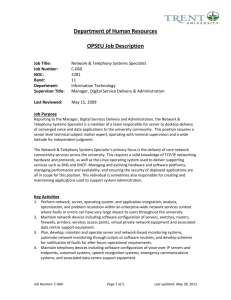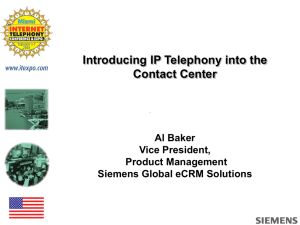IP T W
advertisement
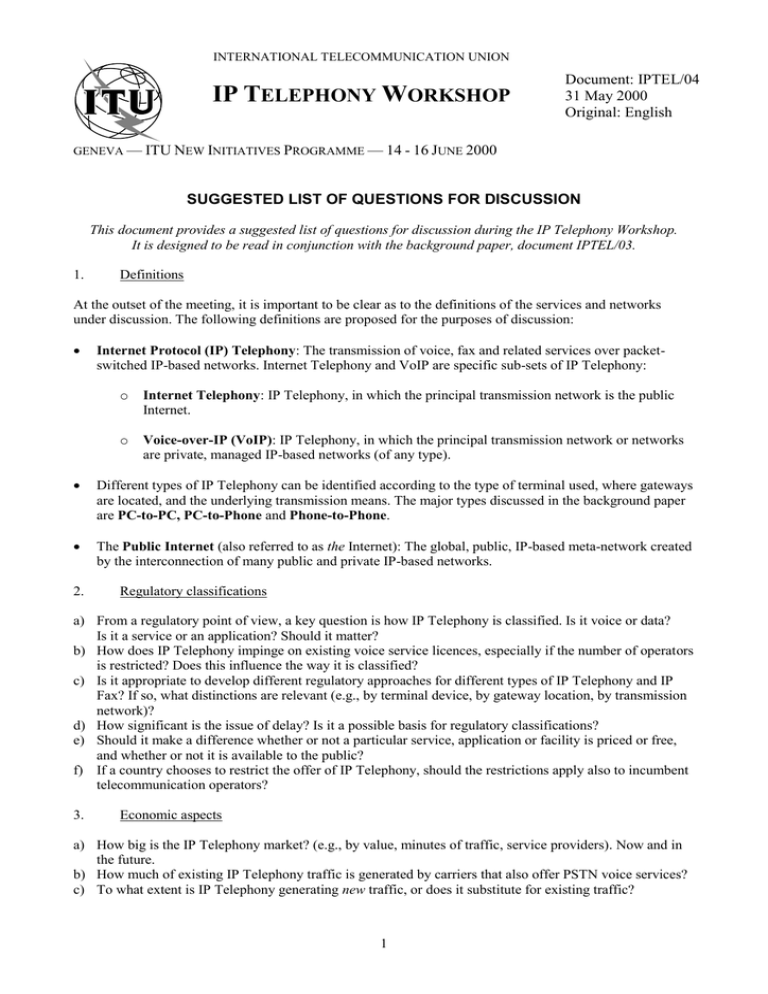
INTERNATIONAL TELECOMMUNICATION UNION IP TELEPHONY WORKSHOP Document: IPTEL/04 31 May 2000 Original: English GENEVA — ITU NEW INITIATIVES PROGRAMME — 14 - 16 JUNE 2000 SUGGESTED LIST OF QUESTIONS FOR DISCUSSION This document provides a suggested list of questions for discussion during the IP Telephony Workshop. It is designed to be read in conjunction with the background paper, document IPTEL/03. 1. Definitions At the outset of the meeting, it is important to be clear as to the definitions of the services and networks under discussion. The following definitions are proposed for the purposes of discussion: Internet Protocol (IP) Telephony: The transmission of voice, fax and related services over packetswitched IP-based networks. Internet Telephony and VoIP are specific sub-sets of IP Telephony: o Internet Telephony: IP Telephony, in which the principal transmission network is the public Internet. o Voice-over-IP (VoIP): IP Telephony, in which the principal transmission network or networks are private, managed IP-based networks (of any type). Different types of IP Telephony can be identified according to the type of terminal used, where gateways are located, and the underlying transmission means. The major types discussed in the background paper are PC-to-PC, PC-to-Phone and Phone-to-Phone. The Public Internet (also referred to as the Internet): The global, public, IP-based meta-network created by the interconnection of many public and private IP-based networks. 2. Regulatory classifications a) From a regulatory point of view, a key question is how IP Telephony is classified. Is it voice or data? Is it a service or an application? Should it matter? b) How does IP Telephony impinge on existing voice service licences, especially if the number of operators is restricted? Does this influence the way it is classified? c) Is it appropriate to develop different regulatory approaches for different types of IP Telephony and IP Fax? If so, what distinctions are relevant (e.g., by terminal device, by gateway location, by transmission network)? d) How significant is the issue of delay? Is it a possible basis for regulatory classifications? e) Should it make a difference whether or not a particular service, application or facility is priced or free, and whether or not it is available to the public? f) If a country chooses to restrict the offer of IP Telephony, should the restrictions apply also to incumbent telecommunication operators? 3. Economic aspects a) How big is the IP Telephony market? (e.g., by value, minutes of traffic, service providers). Now and in the future. b) How much of existing IP Telephony traffic is generated by carriers that also offer PSTN voice services? c) To what extent is IP Telephony generating new traffic, or does it substitute for existing traffic? 1 d) To what extent is the desire to by-pass the accounting rate system a motivation for providing IP Telephony? What impact is IP Telephony having on settlement payments between countries, especially net settlements made to developing countries? e) What strategies should public telecommunication operators in developing countries take with regard to IP Telephony? Embrace it, try to monopolise it, ignore it, block it, or what? 4. Numbering, naming, addressing and routing issues a) What are the arguments for and against the allocation of an E.164 country code resource for IP Telephony? (e.g., “878 878” has been allocated for trial purposes) b) Would the allocation of such a resource make it easier or harder for those countries that wish to regulate IP Telephony to do so? c) What new services and applications are likely to develop as a result of closer IP/PSTN interworking? 5. Regulatory Obligations on IP Telephony Service Providers a) Should IP Telephony Service Providers (IPTSPs) and Internet Service Providers (ISPs) be licensed? b) At what rates should IPTSPs be afforded access to local networks? (e.g., at the same wholesale interconnect rates as other carriers, at retail rates, or at retail rates plus a margin?) c) What facilities and services, if any, should IPTSPs be obliged to provide? (e.g., Emergency services? Law enforcement assistance? Directory listings? Number/address portability?) d) Should IPTSPs (and ISPs) be required to contribute to universal service funds? e) Should IP Telephony services be subject to the tax regime in the countries of origin and/or destination? 6. Avenues for international co-ordination a) Are there areas where closer international co-ordination might help in resolving the regulatory and economic issues raised by IP Telephony? b) To what extent should the laws and regulations of one country, with regard to the licensing or operation of IP Telephony services, respect the laws and regulations of other countries where the service may be offered? c) What future role, if any, should ITU play with regard to the regulatory and economic issues raised by IP Telephony? 2
